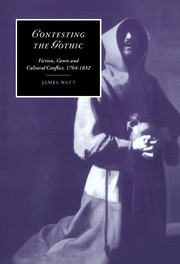Book contents
- Frontmatter
- Contents
- Acknowledgements
- Introduction
- Chapter 1 Origins: Horace Walpole and The Castle of Otranto
- Chapter 2 The Loyalist Gothic romance
- Chapter 3 Gothic ‘subversion’: German literature, the Minerva Press, Matthew Lewis
- Chapter 4 The first poetess of romantic fiction: Ann Radcliffe
- Chapter 5 The field of romance: Walter Scott, the Waverley novels, the Gothic
- Notes
- Bibliography
- Index
- CAMBRIDGE STUDIES IN ROMANTICISM
Chapter 3 - Gothic ‘subversion’: German literature, the Minerva Press, Matthew Lewis
Published online by Cambridge University Press: 22 September 2009
- Frontmatter
- Contents
- Acknowledgements
- Introduction
- Chapter 1 Origins: Horace Walpole and The Castle of Otranto
- Chapter 2 The Loyalist Gothic romance
- Chapter 3 Gothic ‘subversion’: German literature, the Minerva Press, Matthew Lewis
- Chapter 4 The first poetess of romantic fiction: Ann Radcliffe
- Chapter 5 The field of romance: Walter Scott, the Waverley novels, the Gothic
- Notes
- Bibliography
- Index
- CAMBRIDGE STUDIES IN ROMANTICISM
Summary
Grim-visaged heroes, class'd in martial hosts,
And walking skeletons, and sheeted ghosts,
Here hold their court, from German fetters free,
And doom poor common sense to slavery.
Here fleeting phantoms of the heated brain
Swarm forth like locusts from the press of Lane
‘Modern Literature’, Aberdeen Magazine, 1798There is no book perhaps of modern production that has excited a greater share of curiosity, or been more the subject of public opinion, and public conversation, than the Romance of the ‘Monk’
‘Impartial Strictures on the Poem Called “The Pursuits of Literature”: and Particularly a Vindication of the Romance of “The Monk”’, 1798I
While Loyalist Gothic romances followed an uncomplicated pattern, as I argued in the previous chapter, questions nonetheless remain about what precisely contributed to the notoriety of so many other Gothic works in their moment of production. In the first half of this chapter, I want to work towards historicizing this reputation by discussing the connections between the Gothic romance and German literature, and by examining the Gothic romance in relation to the growing market for escapist fiction in general. As a term of self-description for novels and romances, ‘German’ was much more current than ‘Gothic’ in the 1790s, but it increasingly carried a series of revolutionary associations which, by the end of the decade, led to the abuse of virtually every work claiming such a descent.
- Type
- Chapter
- Information
- Contesting the GothicFiction, Genre and Cultural Conflict, 1764–1832, pp. 70 - 101Publisher: Cambridge University PressPrint publication year: 1999

